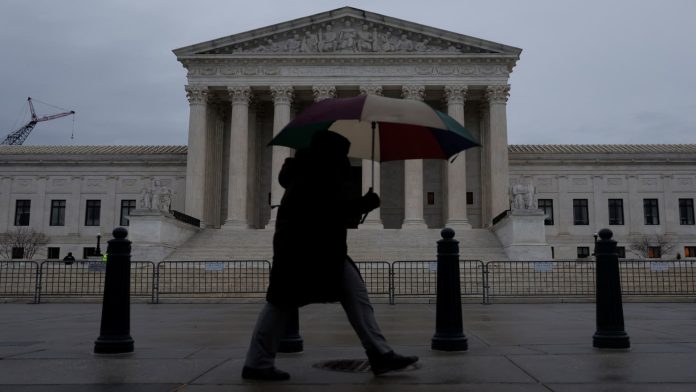[ad_1]
WASHINGTON — President Joe Biden and some of his most prominent Republican adversaries in Congress have become allies, of sorts, in an upcoming Supreme Court showdown between Big Tech and its critics.
The Biden administration is roughly on the same page as prominent Republicans, such as Sens. Ted Cruz of Texas and Josh Hawley of Missouri, in arguing in favor of limits on internet company immunity under a provision of the 1996 Communications Decency Act called Section 230.
The 26 words of legislative text, which have been attributed to aiding the rise of social media, have largely shielded companies from defamation claims and many other lawsuits over content posted by users.
Both senators, jostling for attention on the populist wing of the Republican Party, have been prominent thorns in Biden’s side, even before he took office. They both objected to the certification of the 2020 election results as part of former President Donald Trump’s ill-fated campaign to remain in power that culminated in the Jan. 6 riot at the Capitol.
But the loose alliance in a case involving YouTube that the court hears on Tuesday illustrates how opposition to the broad immunity companies receive for their content moderation decisions and what content users post cuts across ideological lines. There are also unusual bedfellows backing YouTube owner Google, with the left-leaning American Civil Liberties Union, the libertarian Cato Institute and the corporate giant U.S. Chamber of Commerce all taking their side.
The case takes aim at a central feature of the modern internet: the targeted recommendation. Apps like YouTube want to keep users on their sites, so they try to show them related content that will entice them to click. But opponents argue that the company should be liable for that content. If consumers could sue apps over the consequences of those decisions, tech companies might have to upend how they design their products — or at least be more careful about what content they promote.
Samir Jain, vice president of policy at the Center for Democracy and Technology, a tech-aligned group backing Google, said that although Biden, Cruz and Hawley have all criticized Section 230, they diverge on what to replace it with. Democrats would like to see companies take a stronger hand in moderating content, while Republicans, perceiving an anti-conservative bias, want fewer constraints overall.
“There’s common cause in the sense of believing that Section 230 is too broad but not common cause in what they are trying to accomplish at the end of the day,” Jain said.
The case before the Supreme Court on Tuesday centers on claims that YouTube’s actions contributed to the death of an American woman in the 2015 Islamic State terrorist attacks in Paris by recommending certain videos. Family members of Nohemi Gonzalez, one of 130 people killed in the series of linked attacks in Paris carried out by the militant Muslim group, commonly known as ISIS, seek to sue the company under an anti-terrorism law. YouTube says it should not be held liable in these deaths.
The court is hearing a related case on Wednesday in which relatives of Nawras Alassaf, a Jordanian citizen killed in an Islamist attack in Istanbul in 2017, accuse Twitter, Google and Facebook of aiding and abetting the spread of militant Islamic ideology, which the companies deny. The justices will not be addressing Section 230 in that case.
In the Google case, Principal Deputy Solicitor General Brian Fletcher, representing the Biden administration, took a similar position in his brief to the one that Cruz and other Republicans took in their own brief. Hawley filed a separate brief opposing Google. Cruz and Hawley are both lawyers who once clerked at the high court.
In all three briefs, the unlikely allies contend that Section 230 does not provide immunity over claims relating to recommendation algorithms, the key question in the case, although the substance of the legal arguments differs.
The lawsuit targets YouTube’s use of algorithms to suggest videos for users based on the content they have previously viewed. YouTube’s active role goes beyond the kind of conduct Congress intended to protect with the 27-year-old law, the family’s lawyers allege. The plaintiffs do not allege that YouTube had any direct role in the killing.
The stakes are high because recommendations are now an industry norm. Apps such as Instagram, TikTok, Facebook and Twitter long ago began to rely on recommendation engines, or algorithms, to decide what people see most of the time, rather than emphasize chronological feeds or content that people have vetted.
Biden took a shot at tech companies in his State of the Union address earlier this month, although he did not mention Section 230. He was more specific in a Wall Street Journal op-ed last month in which he called for reform, saying companies need to “take responsibility for the content they spread and the algorithms they use.” A White House spokesperson declined to comment on the administration’s position in the case.
Cruz said in an interview that while there might be some common ground on legislation to overhaul Section 230, the Biden administration is mostly OK with companies “censoring” views with which they disagree.
“Big Tech engages in blatantly anti-competitive activity. They enjoy monopoly profits. And they use that power to, among other things, censor and silence the American people and I believe we should use every tool at our disposal to stop that,” he said.
Hawley said that Section 230 is “almost entirely a creation of the courts” and that Congress had not intended it to confer blanket immunity.
“I think this is an opportunity for the Supreme Court to disentangle some of the knots that the courts themselves have woven here into the law,” he said in an interview.
Mukund Rathi, a lawyer at the Electronic Frontier Foundation, said it was disappointing but not surprising from his perspective that Biden joined Republicans in weighing in against Google.
He warned of broad repercussions if Google loses, noting that volunteer moderators on Reddit could, for example, become liable for their actions, a point the company made in a brief.
“The rhetoric is that these are bad powerful tech companies that are harming ordinary people and causing a lot of harm and injustice,” Rathi said. In reality, if Section 230 is weakened, “you are going to end up harming those ordinary people.”
But even some people in the tech industry have come around to the idea of paring back Section 230. Roger McNamee, a venture capitalist who was an early investor in Facebook, said in an interview that companies shouldn’t receive immunity for their decisions to amplify certain content.
“This is the first opportunity that the Supreme Court has to stand up for the American people in the face of a tech industry that has undermined public health, democracy and public safety,” he said.
[ad_2]
Source link



